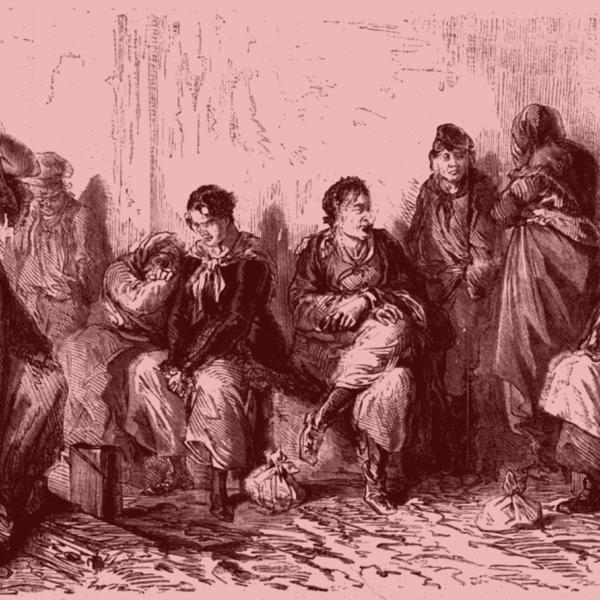Heather Berg discusses her new book about labor conditions in the porn and sex work industries.

In her new book Porn Work: Sex, Labor, and Late Capitalism, Heather Berg argues that dramatic recent changes in labor conditions in the porn industry reveal broader shifts in the labor market. Berg, an assistant professor of women, gender, and sexuality studies, researches and teaches Marxist feminist and queer thought, resistance studies, and sexuality studies. Porn Work was published this month by the University of North Carolina Press.
In this Q&A, Berg talks about the working conditions in porn, her assessment of the relationship between porn work and “straight” work, and the challenges of researching sex work.
You’ve argued for a blurring of the line between porn work and “straight work.” Are the two more similar than most people would think?
They’re both more similar than most civilians (what sex workers call people in straight jobs) think and different in ways many wouldn’t guess. More similar because everything that seems exploitative in the porn industry is endemic to all sorts of work under capitalism. One thing I hope this book can do is to encourage people who think porn is bad work to understand that all work is, to varying degrees, bad work. And people who think porn isn’t work at all because its conditions can be abusive need to investigate their romantic ideas about other jobs. But porn is unlike straight jobs in that there are more opportunities for working independently, without a boss, in sex work, and so sex workers have the power to walk away from a bad gig in ways many straight workers never do. The other piece that is of course different is criminalization and stigma, and I think paying attention to the realities of the work helps combat both.
How have the working conditions of porn workers changed over the past few years?
Hugely. On the one hand, conditions and pay have gotten worse on traditional sets because large production companies are making less money and (like straight employers) forcing workers to absorb the cost of lost profits through lower pay and more intensive work. On the other, it’s become much easier for performers to produce and distribute their own content thanks to the explosion of digital platforms that cut out the traditional middle man. That strategy, though, is vulnerable to anti-sex worker policy such as FOSTA/ SESTA and platform and banking discrimination. Working conditions get measurably worse when sex workers can’t advertise, connect with fans, and process payments freely. Anti-porn feminists support these discriminatory policies, ironically giving sex workers less power.
In your book, you talk about a “working landscape in crisis.” What do the working conditions for the porn industry reveal about the nature of work more broadly?
What I’m talking about here is a much bigger crisis of late capitalism, where working conditions are getting worse, employers don’t pay a living wage, and the state fails to protect workers from occupational health risk, workplace racism, wage theft, and so on. It’s because of these worsening conditions in straight work that so many people pursue porn work in the first place — many interviewees talked about doing porn as a way to avoid the terrible conditions in straight jobs. But the crisis of capitalism shapes porn’s working conditions too, and workers there encounter many of the same struggles.
What were some of the challenges in researching this book?
Porn’s conditions are constantly changing in response to technological and policy shifts, and so as soon as I finished a draft a new massive change would require going back to the drawing board. I also struggled with decisions about how to tell the story, since anything sex workers say is so vulnerable to being appropriated by anti-sex worker forces. As Lorelei Lee, who’s also interviewed in the book, writes, “I know exactly how good anti-sex work ‘feminists’ are at carving out the pieces of our stories to make them mean something else, something less complicated and more easily sold.” In the end, after many conversations with workers, I decided to tell the full story, because there’s no way to guard against bad faith readings. Finally, probably the biggest challenge in researching the book was that I did most of the research while working as a contingent academic, before I got this job. I wrote about porn workers’ struggles with job insecurity, lack of healthcare, and abusive management at the same time as I was navigating those things myself.
What would it take to build a better working landscape? What would that look like?
Working conditions in all sorts of jobs will continue to be abusive so long as we live under capitalism, but there are policy changes that could make a big difference for people right now. First, the social welfare state needs to respond to the gig economy by ensuring that all people have access to labor rights (such as protections from harassment and discrimination) and benefits (such as healthcare and disability insurance) regardless of whether they are formally employed. Second, policy needs to support sex workers’ labor rights and autonomy. Decriminalizing all sex work and ending platform, banking, and housing discrimination would hugely improve working conditions. Finally, people who aren’t policymakers can help improve conditions by combatting anti-sex worker stigma in their own communities, and by dealing with their own sexual shame so that sex workers don’t have to bear that burden.




